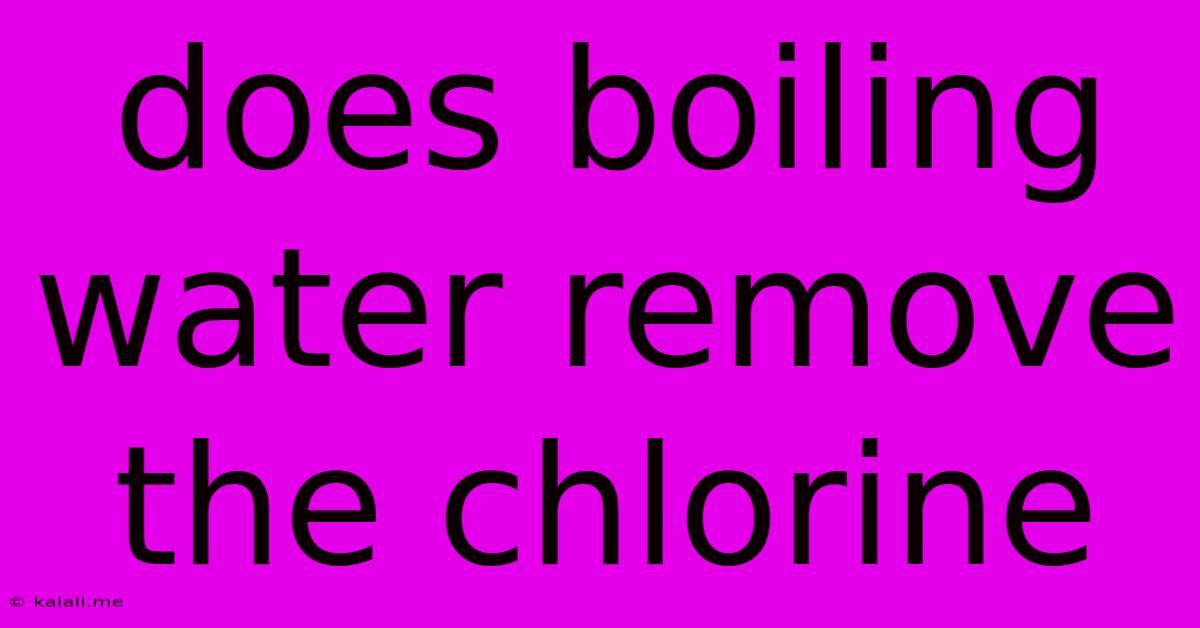Does Boiling Water Remove The Chlorine
Kalali
May 21, 2025 · 3 min read

Table of Contents
Does Boiling Water Remove Chlorine? A Comprehensive Guide
Boiling water is a common method used for purifying water, but does it effectively remove chlorine? The short answer is: partially, yes, but not completely. This article will delve into the science behind chlorine removal through boiling, explore the effectiveness of this method, and discuss alternative options for chlorine removal if complete elimination is necessary.
Understanding Chlorine in Water
Chlorine is added to municipal water supplies as a disinfectant to kill harmful bacteria and viruses. While essential for public health, high levels of chlorine can impart an unpleasant taste and odor to water, and some people are sensitive to its presence. This is why many seek ways to reduce or eliminate chlorine from their drinking water.
How Boiling Affects Chlorine
Boiling water does reduce chlorine levels, but the mechanism isn't a complete chemical removal. The process works primarily through volatilization. Chlorine, in its most common form in water (hypochlorous acid and hypochlorite ions), is volatile, meaning it readily evaporates. When water boils, these chlorine compounds are released into the air as a gas, lowering the concentration in the remaining water.
However, it's crucial to understand that not all chlorine is removed. Boiling only removes the free chlorine, which is the most volatile form. Other chlorine byproducts, such as trihalomethanes (THMs) – which are formed when chlorine reacts with organic matter in the water – are less volatile and remain in the water even after boiling. While THMs are typically present at lower concentrations than free chlorine, their presence raises health concerns for some.
Effectiveness of Boiling for Chlorine Removal
The effectiveness of boiling for chlorine reduction depends on several factors:
- Initial chlorine concentration: Higher initial chlorine levels will result in more chlorine being removed through boiling, but some will still remain.
- Boiling time: Longer boiling times lead to greater chlorine reduction. A rolling boil for several minutes is generally recommended.
- Water volume and surface area: A larger surface area exposed to the air during boiling facilitates more efficient volatilization.
Alternative Methods for Chlorine Removal
If complete chlorine removal is desired, boiling alone is insufficient. Other methods are more effective at removing both free chlorine and chlorine byproducts:
- Activated Carbon Filtration: Carbon filters effectively adsorb chlorine and other impurities from water. This is a widely used and highly effective method.
- Distillation: Distillation involves boiling water and collecting the condensed steam. This process removes most impurities, including chlorine and chlorine byproducts.
- Reverse Osmosis: Reverse osmosis uses pressure to push water through a semi-permeable membrane, separating impurities, including chlorine, from the water.
Conclusion:
While boiling water can reduce chlorine levels to some extent, it's not a foolproof method for complete removal. For those sensitive to chlorine or seeking to eliminate chlorine byproducts, alternative methods like activated carbon filtration, distillation, or reverse osmosis are more effective. The choice of method will depend on individual needs and budget. Remember that the goal is always to have safe, clean, and palatable water.
Latest Posts
Latest Posts
-
How Rare Can You Eat A Steak
May 21, 2025
-
Clash Of The Titans Type Movies
May 21, 2025
-
How Does Gibbs Get The Boat Out Of The Basement
May 21, 2025
-
What Is The Plural Of Business
May 21, 2025
-
What Is The Difference Between Pasta And Noodles
May 21, 2025
Related Post
Thank you for visiting our website which covers about Does Boiling Water Remove The Chlorine . We hope the information provided has been useful to you. Feel free to contact us if you have any questions or need further assistance. See you next time and don't miss to bookmark.